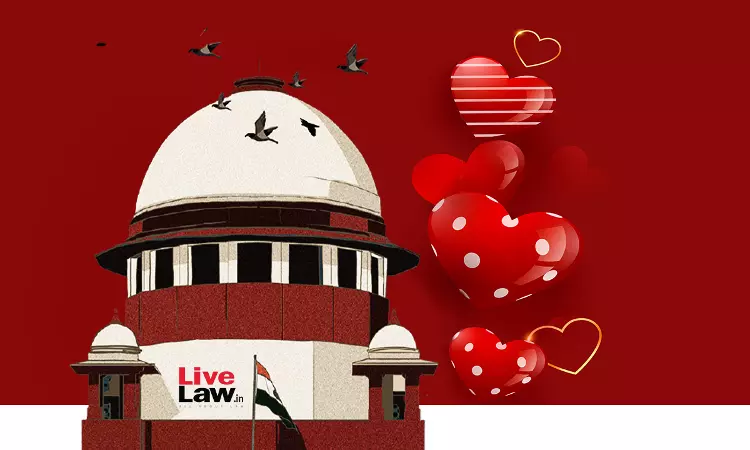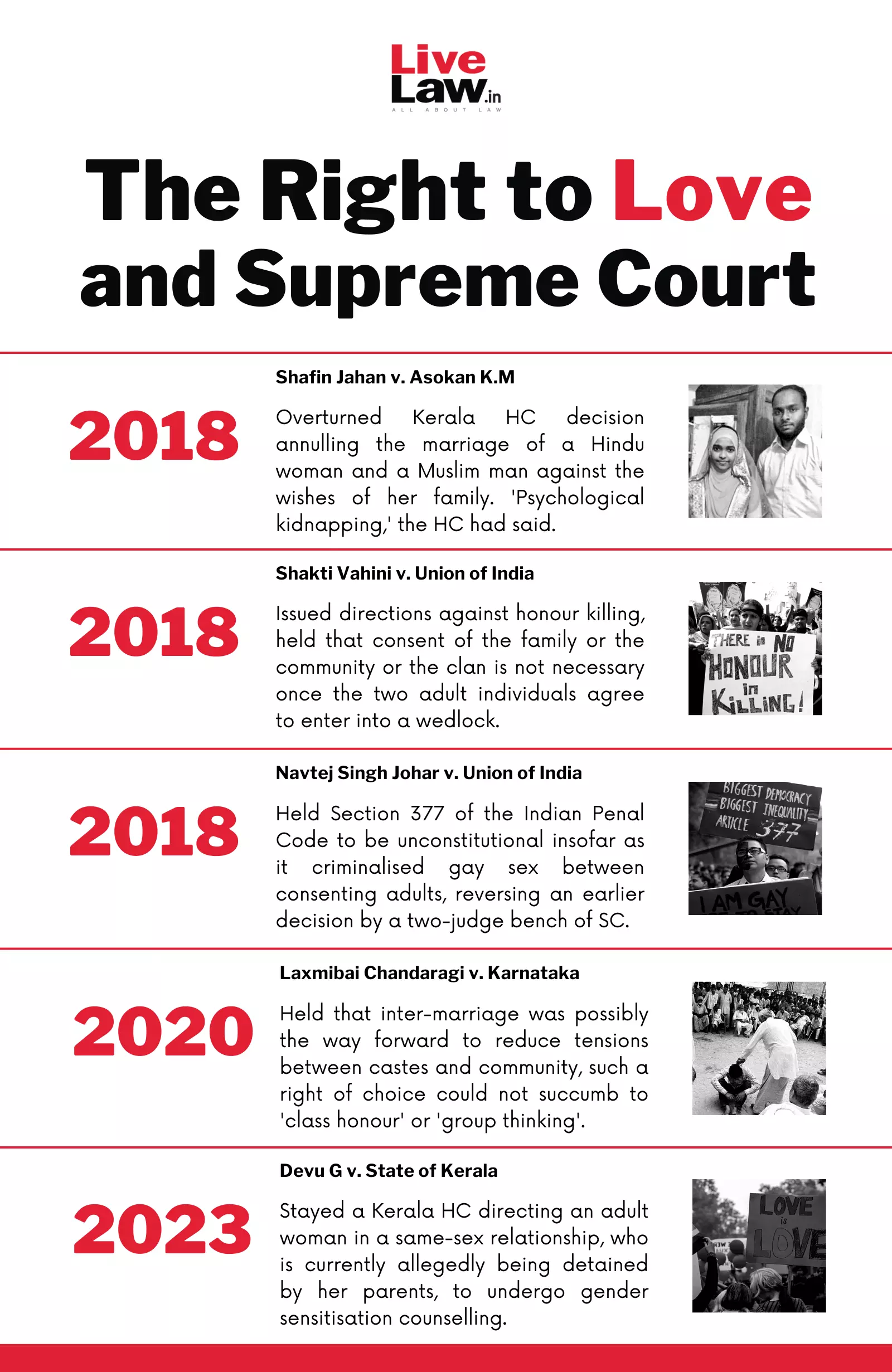Valentine’s Day : Right to Love & Indian Supreme Court
Awstika Das
14 Feb 2023 5:19 PM IST

Valentine’s Day is upon us again. It is a holiday of mysterious provenance but has come to widely represent a festival of love and devotion (not to mention, consumerism) that is celebrated and dreaded in equal measure. Whether you have a significant other, are (un)happily unattached, think Valentine’s Day is nothing more than a grotesque capitalistic spectacle, or rail against the ‘dazzle of western civilisation’, there is no escaping the fourteenth of February, and all the associated symbols and paraphernalia – roses, hearts, chocolates, wild romantic gestures, the whole nine yards. But even as you choose to exercise your choice to partake (or not) in the festivities, there are many around the world and in this country for whom this day is a reminder that they have been dispossessed of this choice.
Justice Leila Seth was a woman of many firsts. She was the first woman to be designated as a senior counsel by the Supreme Court of India. She was the first woman judge of the Delhi High Court. Later, she went on to become the first woman chief justice of a high court (Himachal Pradesh High Court). In 2014, she also wrote an incisive piece titled ‘A mother and a judge speaks out on section 377’ published in a national daily, weeks after the top court decided to overturn a Delhi High Court ruling that decriminalised homosexuality. “But our eldest, Vikram, is now a criminal, an unapprehended felon. This is because, like many millions of other Indians, he is gay,” wrote Justice Seth, appealing both to reason and compassion. Although she did not live to see the Supreme Court right this wrong almost five years later by striking down the controversial Section 377 in the Indian Penal Code to the extent that it criminalised homosexuality, her words were reproduced by Justice D.Y. Chandrachud (as he was then) as the preface of his concurring opinion.
“What makes life meaningful is love. The right that makes us human is the right to love. To criminalize the expression of that right is profoundly cruel and inhumane. To acquiesce in such criminalization, or worse, to recriminalize it, is to display the very opposite of compassion. To show exaggerated deference to a majoritarian Parliament when the matter is one of the fundamental rights is to display judicial pusillanimity, for there is no doubt, that in the constitutional scheme, it is the judiciary that is the ultimate interpreter.”
The judges on the Navtej Singh Johar bench not only understood the transformative value of the Indian Constitution but also possessed a remarkable awareness of social realities. Justice Chandrachud, for instance, wrote, “The struggle of citizens belonging to sexual minorities is located within the larger history of the struggles against various forms of social subordination in India. The order of nature that Section 377 speaks of is not just about nonprocreative sex but is about forms of intimacy which the social order finds ‘disturbing’. This includes various forms of transgression such as inter-caste and inter-community relationships which are sought to be curbed by society. What links LGBT individuals to couples who love across caste and community lines is the fact that both are exercising their right to love at enormous personal risk and in the process disrupting existing lines of social authority.” Justice Chandrachud explained that a re-imagination of the order of nature was not only about the prohibition of non-procreative sex but instead about the limits imposed by structures such as gender, caste, class, religion, and community. This is what made the right to love not just a separate battle for LGBT individuals, but a battle for all, the judge said.
Commended (and equally often, derided) as an activist court, the Indian Supreme Court has, especially over the last few years, been a steadfast ally for lovebirds in the ‘battle’ that Justice Chandrachud mentioned. It has restored the choice to openly love and celebrate love to those who have been traditionally robbed of this choice. From firmly upholding Hadiya’s choice to marry a man of a different religion against the wishes of her family, to staying a controversial ruling directing a woman in a same-sex relationship to undergo gender sensitisation counselling, we take a look at the some instances of the top court endorsing the right to love.

Quotable quotes
"The consent of the family or the community or the clan is not necessary once the two adult individuals agree to enter into a wedlock. When two adults consensually choose each other as life partners, it is a manifestation of their choice which is recognized under Articles 19 and 21 of the Constitution" - Shakti Vahini vs Union of India
"How Hadiya chooses to lead her life is entirely a matter of her choice.In deciding whether Shafin Jahan is a fit person for Hadiya to marry, the High Court has entered into prohibited terrain. Our choices are respected because they are ours. Social approval for intimate personal decisions is not the basis for recognizing them. Indeed, the Constitution protects personal liberty from disapproving audiences"- Shafin Jahan vs Asokan KM
"The strength of our Constitution lies in its acceptance of the plurality and diversity of our culture. Intimacies of marriage, including the choices which individuals make on whether or not to marry and on whom to marry, lie outside the control of the state. Courts as upholders of constitutional freedoms must safeguard these freedoms"- Shafin Jahan vs Asokan KM.
"Educated younger boys and girls are choosing their life partners which, in turn is a departure from the earlier norms of society where caste and community play a major role. Possibly, this is the way forward where caste and community tensions will reduce by such inter marriage but in the meantime these youngsters face threats from the elders and the Courts have been coming to the aid of these youngsters"- Laxmibai Chandaragi vs State of Karnataka
"the consent of the family or the community or the clan is not necessary once the two adult individuals agree to enter into a wedlock and that their consent has to be piously given primacy. It is in that context it was further observed that the choice of an individual is an inextricable part of dignity, for dignity cannot be thought of where there is erosion of choice. Such a right or choice is not expected to succumb to the concept of "class honour" or "group thinking."-Laxmibai Chandaragi vs State of Karnataka
“Consensual sexual relationships between adults, based on the human propensity to experience desire must be treated with respect. In addition to respect for relationships based on consent, it is important to foster a society where individuals find the ability for unhindered expression of the love that they experience towards their partner”- Navtej Johar vs Union of India
"Familial relationships may take the form of domestic, unmarried partnerships or queer relationships. A household may be a single parent household for any number of reasons, including the death of a spouse, separation, or divorce. Similarly, the guardians and caretakers (who traditionally occupy the roles of the "mother" and the "father") of children may change with remarriage, adoption, or fostering. These manifestations of love and of families may not be typical but they are as real as their traditional counterparts. Such atypical manifestations of the family unit are equally deserving not only of protection under law but also of the benefits available under social welfare legislation"- Deepika Singh versus Central Administrative Tribunal
When love becomes 'war', court to rescue
You must be familiar with the hackneyed old proverb – “All’s fair in love and war”. But, what no one tells you as you grow up is that sometimes, love is war, even more so if your love is not ‘conventional’. “What will people say,” your parents whisper to you in hushed tones, putting an untimely damper on your romantic aspirations. Words like ‘honour’, ‘family’, and ‘shame’ populate the ensuing discourse, which is less of a discourse and more of a “That course of action is prohibited”. It is ironic that a society that routinely engages in loud, public, and performative displays of love and commitment and thrives on their Bollywood/ Kollywood/ Tollywood ‘happily ever afters’, is also disturbingly intolerant of ‘love’ that does not conform. Therefore, whether you adore, loathe, or are simply indifferent to this great, grand glitter-dipped festival of love, we ask you to take a moment to appreciate all the times that the Supreme Court has come to the rescue of the brave hearts who are waging their own wars against their families, and the society at large.


